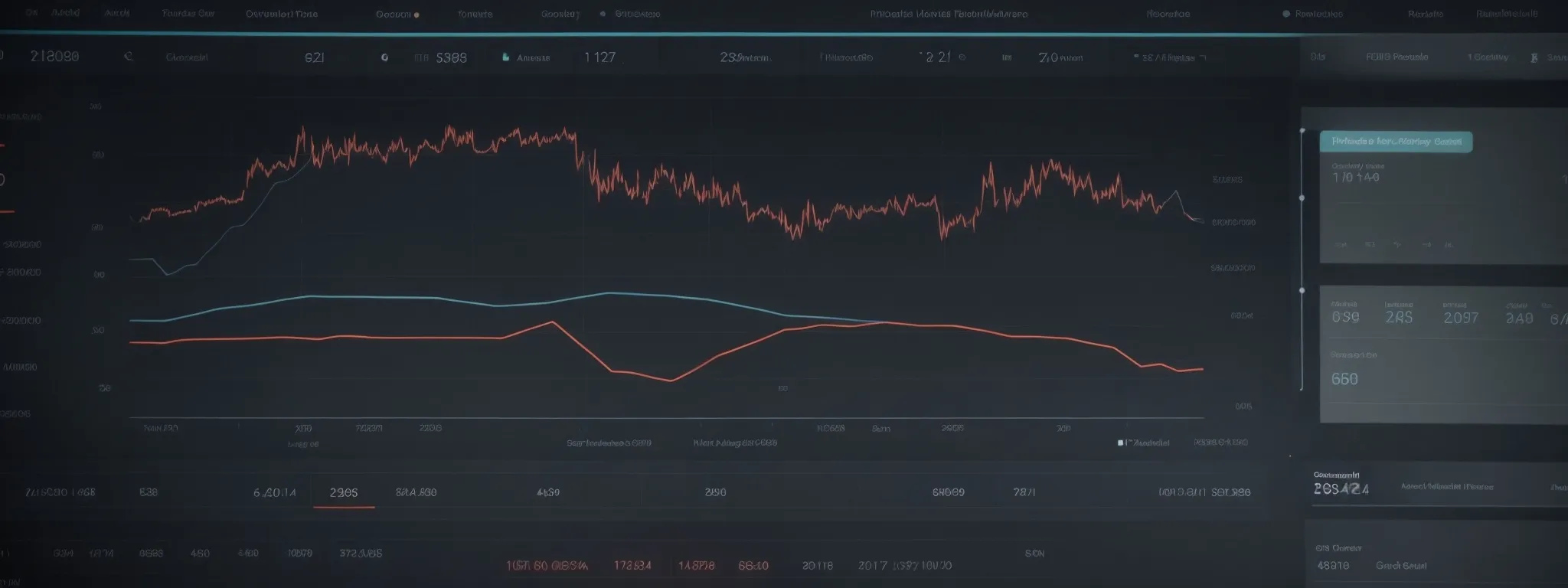Enterprise SEO Tools For Keyword Research Compared
Comparing the Best Enterprise SEO Tools for Effective Keyword Research Navigating the vast sea of enterprise SEO tools can be a daunting task for businesses striving to […]
Comparing the Best Enterprise SEO Tools for Effective Keyword Research
Navigating the vast sea of enterprise SEO tools can be a daunting task for businesses striving to dominate their market space through meticulous keyword research.
Crisp, actionable data coupled with robust analytics forms the backbone of an effective SEO strategy, and selecting the right toolset is pivotal for tracking performance indicators that propel search engine rankings.
With nuances such as advanced keyword discovery features, pricing flexibility, and user support variations, the quest for the optimal platform is both complex and critical.
This comparative analysis zeroes in on top-tier solutions, dissecting their capabilities to help companies uncover keyword opportunities that drive targeted traffic.
Keep reading to unlock insights that can streamline your enterprise SEO efforts and elevate your digital marketing campaign.
Key Takeaways
- Enterprise SEO Tools Are Essential for Enhancing Online Presence and Search Engine Rankings
- Integration Capabilities and Scalability Are Key Factors in Selecting a Robust SEO Platform
- Real-Time Data and Predictive Analytics Are Critical for an Agile and Proactive SEO Strategy
- Custom Reporting and Visual Data Representations Fortify Strategic Decision-Making in SEO Campaigns
- Effective Enterprise SEO Tools Combine Extensive Keyword Research With Cost-Effective Solutions
Evaluating Enterprise SEO Tools for Keyword Research

In the sprawling realm of digital marketing, enterprise SEO tools have emerged as the linchpin for a successful search engine optimization strategy.
Through careful evaluation of such tools, companies can substantially enhance their online presence, particularly by leveraging advanced keyword research capabilities.
Essential features of these tools vary and typically include sophisticated keyword database access, precision in data analysis, and user-centric interfaces that simplify complex tasks.
This evaluation also delves into the integration with other platforms, ensuring a seamless digital marketing workflow and fostering collaboration among teams.
As enterprises aspire to expand their reach, the scalability of these SEO tools must align with business growth trajectories, positioning them as indispensable assets for any SEO campaign aimed at boosting search engine visibility.
Identifying Core Features Essential for Research
In the quest to dominate search engine results pages (SERPs), identifying the core features of robust enterprise SEO tools is critical. Foremost among these features is the depth and breadth of the keyword database, which must be both expansive and regularly updated to reflect the evolving landscapes of language and search behavior.
Equally crucial is the tool’s facility for Backlink Analysis, as understanding the web of connections to a company’s web page underpins strategic link-building and outreach efforts. This analysis, paired with comprehensive reporting tools, equips SEO professionals with actionable insights to refine their strategies and stake a claim on coveted SERP positions.
Analyzing Data Accuracy and Keyword Database Size
Data accuracy is a cornerstone for any enterprise SEO platform, as it guides strategic decision-making. Precise data ensures that SEO teams pinpoint the most valuable keywords and understand the intricacies of the search landscape. Therefore, a Comprehensive Enterprise SEO Tool must provide reliable keyword data, keeping enterprises informed and one step ahead in a competitive digital environment.
The size of a keyword database is also a decisive factor when assessing an SEO tool’s effectiveness. A substantial keyword database equips content creators with a plethora of keyword opportunities, powering diverse content strategies that cater to the specific needs of a target audience. A sophisticated enterprise SEO solution must extend beyond basic search terms, offering deep insights into long-tail keywords and emerging trends.
Comparing User Experience and Interface Simplicity
The user experience and ease of use of enterprise SEO tools can drastically affect the productivity of SEO professionals. An intuitive interface allows for quick adaptation and minimizes the need for extensive training, fostering an environment where SEO tasks can be performed with efficiency and precision.
To decide on the ideal enterprise SEO platform, one must consider not only its features but also its usability. The complexity of the tool should not impede the user’s ability to extract meaningful insights and execute SEO strategies effectively:
- Interface layout and design should facilitate effortless navigation and task execution for users across departments.
- Tool responsiveness and speed are essential for handling large volumes of keyword data and complex site audits seamlessly.
- Clear and accessible help resources within the platform ensure that users can resolve any SEO issues or questions quickly.
Assessing the Integration Capabilities With Other Platforms
Integration capabilities of enterprise SEO tools are indispensable for fostering a cohesive digital marketing ecosystem. They enable seamless data exchange among content marketing, search performance tracking, and customer relationship management platforms, enriching the strategic insights available to each team.
A robust enterprise SEO platform must therefore offer APIs or native integrations that streamline workflows between departments, allowing marketing tools to communicate effectively and maintain a unified approach to SEO efforts across the enterprise.
Considering Scalability for Growing Businesses
Scalability in the context of enterprise SEO tools is a formidable factor that supports the growth and expansion of a business. Such tools need to accommodate increasing volumes of searches, expand keyword tracking parameters, and handle the influx of SEO tasks without diminishing performance or user experience.
For enterprises charting a course through the competitive waters of their industries, the ability of an SEO platform to grow congruently with the company is paramount. It must provide the robust infrastructure required to manage the expanding scopes of campaigns while maintaining accurate results and remaining aligned with the SEO strategy.
Checking for Collaborative Functionalities for Teams
In today’s complex SEO landscape, the synergy within teams is bolstered by the collaborative features of enterprise SEO tools. A platform’s ability to facilitate real-time collaboration, document sharing, and communication ensures that SEO strategies are effectively implemented and flawlessly coordinated among team members.
Effective collaboration hinges on an SEO platform’s capacity to Integrate Seamlessly with project management and team communication tools. These functionalities foster a harmonized workflow, enabling SEO professionals to synchronize their efforts and optimize their campaign’s performance:
- Shared access to keyword research, content creation plans, and performance indicators provides a unified SEO task list.
- Real-time editing and commentary features allow for collective input and instant feedback, streamlining the creation and optimization process.
- Permission settings and role definitions ensure that each team member has appropriate access to the platform’s functionalities, maintaining the integrity of the SEO strategy.
The Impact of Data Analytics on Keyword Selection

In an era where data is king, effective keyword research strategies are sculpted by the sophisticated analytics provided by enterprise SEO tools.
These tools are critical in parsing vast keyword databases, helping companies to harness real-time data for precise trend analysis.
They also offer predictive metrics that forecast the potential success of keywords, arming SEO strategists with the foresight necessary to stay ahead of the curve.
Moreover, insights gleaned from competitor keyword analytics empower enterprises to craft informed content strategies that effectively contend within the competitive landscape of search rankings.
How Advanced Analytics Shape Keyword Research Strategies
Advanced analytics in enterprise SEO platforms transform the approach to keyword research by providing insights far beyond basic search volume and competition levels. These platforms draw from extensive keyword data sets to uncover patterns and correlations that offer a granular view of the search landscape.
Armed with advanced analytic capabilities, SEO professionals can discern the intent behind search queries, enabling them to tailor content that resonates with the user’s needs and aligns with search engine algorithms:
- Analytics tools assess keyword trends, predicting the rise of new search terms and the waning of others.
- Advanced metrics gauge the relative value of keywords based on their potential impact on traffic and conversion rates.
- Integration with AI-driven insights offers foresight into emerging market shifts, preparing companies to adapt promptly.
These strategic advantages equip enterprise businesses with the acumen for crafting SEO Strategies That Are Not Only Responsive to current market conditions but are also predictive, preparing for future shifts in user behavior and search dynamics.
Importance of Real-Time Data for Trend Analysis
Real-time data holds an instrumental role in trend analysis, delivering immediate insights that enterprise SEO professionals require to make informed decisions. This instant feedback allows for the prompt identification of shifts in search behavior, which can significantly influence the relevance and timeliness of a company’s content, ensuring that SEO efforts are aligned with the current interests of the target audience.
For enterprises aiming to maintain a competitive edge in search engine rankings, the usage of real-time data for trend analysis is not just a feature; it is an essential component of an agile SEO strategy. It empowers marketers to refine their content to match emerging trends, capitalizing on untapped keyword opportunities before they become oversaturated in the market.
Tools That Offer Predictive Keyword Success Metrics
The utilization of SEO tools equipped with predictive keyword success metrics can be the linchpin for fortifying an SEO strategy with data-driven foresight. These tools scrutinize historical data and search engine behaviors to forecast keyword performance, equipping SEO professionals with the insights to target high-potential keywords for their campaigns.
Such predictive analytics are transforming the SEO landscape by allowing marketers to anticipate user needs and adjust their efforts ahead of emerging search trends. This proactive approach to SEO, driven by sophisticated predictive metrics, allows enterprise businesses to allocate resources more effectively and position their web presence at the forefront of their industry.
Understanding Competitor Keyword Analytics
Competitor keyword analytics offer a window into rivals’ SEO tactics, granting enterprise SEO teams the ability to discern patterns in competitors’ search performance. By utilizing LinkGraph’s Advanced SEO Services, enterprises gain access to competitive intelligence that informs the development of more effective SEO strategies.
Through a Meticulous Examination of Competitors’ Keyword Usage and search engine results pages, LinkGraph’s SEO solutions illuminate opportunities for differentiation and market advantage. This feature of competitor analysis is integral to the crafting of strategic content that outperforms the competition in SERPs, driving superior SEO results.
Advanced Features That Enhance Keyword Discovery

The realm of keyword research is constantly evolving, and selecting the right enterprise SEO tools is imperative for uncovering the most effective keywords.
Advanced features within these tools are shaping the future of search engine optimization by embracing semantic search capabilities, integrating artificial intelligence for the discovery of long-tail keywords, emphasizing the significance of local search functionalities, and incorporating filtering options for more streamlined research processes.
These features collectively form the backbone of a powerful SEO toolset, allowing enterprises to advance their digital presence and direct their content to meet the precise needs of their target audience.
Semantic Search Capabilities Within SEO Tools
Within the burgeoning ecosystem of enterprise SEO tools, the integration of semantic search capabilities stands at the forefront of enhancing keyword discovery. Such innovative technologies comprehend the contextual meanings behind keywords, thereby enabling SEO platforms to glean a more profound understanding of user intent and search engine queries.
LinkGraph’s SEO services, with its Search Atlas SEO Tool, harness the potential of semantic search to capture a broader spectrum of accurate, relevant keyword suggestions. This empowers businesses to craft website content meticulously aligned with the complexities of natural language use and search behaviors, ultimately leading to improved search engine rankings and user engagement.
The Role of AI in Uncovering Long-Tail Keywords
Artificial Intelligence (AI) plays a pivotal role in unearthing long-tail keywords that might otherwise remain obscured by the limitations of traditional search methods. The implementation of AI allows enterprise SEO solutions to analyze vast datasets, recognize patterns, and predict the niche phrases that users are likely to use in their search queries.
Its ability to process natural language with remarkable efficiency means that AI can offer a company access to a more nuanced keyword spectrum, ensuring the inclusion of long-tail keywords that resonate deeply with a specific target audience:
| Feature | Impact on Keyword Research |
|---|---|
| Pattern Recognition | AI identifies user behavior trends, revealing under-the-radar long-tail keywords. |
| Natural Language Processing | AI comprehends user intent, enhancing the precision of keyword suggestions. |
| Predictive Analysis | AI forecasts emerging long-tail keywords, offering a competitive edge in content strategies. |
Incorporating AI into SEO platforms elevates the discovery process by pinpointing unique keywords optimized for both relevance and conversion potential, aligning enterprise content with focused user search inquiries.
Importance of Local Search Features in Keyword Tools
Local Search Capabilities are a cornerstone for enterprises targeting region-specific audiences. LinkGraph’s SEO services acknowledge this by incorporating local search features into their SEO tools, enabling companies to fine-tune their strategies and enrich their presence in geographic-specific search engine results pages.
Understanding the nuances of local vernacular and search habits can dramatically bolster an enterprise’s visibility to a community-centric customer base. Local Search Features in Keyword Tools empower businesses to capture the essence of regional intent, fostering a stronger connection with customers and supporting a more localized, impactful marketing strategy.
Filtering Options That Streamline Keyword Research
The precision of keyword research is amplified by the filtering options available in advanced enterprise SEO tools. By utilizing these features, SEO professionals can quickly parse through expansive keyword databases to extract the most relevant and impactful terms tailored to their campaigns.
LinkGraph’s SEO services enhance the keyword selection process through sophisticated filtering options which include search volume, competition level, and keyword effectiveness index. These streamlined search capabilities ensure that time and resources are allocated efficiently, concentrating on the keywords most likely to drive search performance and meet the company’s marketing objectives.
Understanding Pricing Structures of SEO Platforms

When considering the deployment of enterprise SEO tools, discerning the pricing structures becomes a fundamental step in the selection process.
Enterprises must scrutinize the spectrum of subscription plans, evaluating the amalgamation of features each tier offers to ensure it aligns with their strategic needs.
Analysis of cost-effectiveness is pivotal for enterprises to validate the investment in an SEO platform, weighing the scope of tools against their operational budget.
It’s prudent for businesses to explore free trial options, despite their inherent limitations, to gauge the capabilities of a prospective platform.
Moreover, a clear understanding of any potential hidden costs and the long-term value additions provided by the service is essential in forming a comprehensive view of the tool’s worth.
By delving into these financial considerations, enterprises can secure an SEO solution that not only fits their economic perimeters but also amplifies their digital marketing efficacy.
Breakdown of Subscription Plans and Their Features
Subscription plans for enterprise SEO tools are as varied as the features they offer, with each tier designed to cater to different scales of SEO needs and budgets. From basic packages providing access to essential keyword research tools and rank trackers, to premium plans that include full suites of advanced features like backlink analysis, content optimization, and extensive reporting tools, enterprises must choose a plan that aligns with their objectives and resources.
Enterprises benefit significantly from plans that strike an optimal balance between cost and functionality, taking into consideration factors such as the number of user licenses, depth of keyword data, and the extent of customer support. It’s critical that companies assess each plan’s potential to power their SEO campaign and deliver tangible return on investment:
| Plan | Keyword Research Tools | Rank Trackers | Backlink Analysis | Content Optimization | Reporting Tools |
|---|---|---|---|---|---|
| Basic | Limited | Yes | No | No | Basic |
| Premium | Extensive | Yes | Advanced | Yes | Detailed |
Assessing Cost-Effectiveness for Enterprise Needs
In the dynamic landscape of enterprise SEO, evaluating the cost-effectiveness of SEO platforms is imperative for businesses seeking to maximize their digital footprint. Enterprises must weigh the platform’s scalability, comprehensive analytics, and reporting tools against its overall impact on the SEO budget, ensuring that the financial outlay translates into measurable SEO success.
Decision-makers within an enterprise should scrutinize the value delivered by SEO platforms through careful analysis of ROI. An SEO platform’s ability to drive organic search visibility, enhance user experience, and contribute to a positive conversion rate stands as a testament to its cost-effectiveness for the enterprise’s needs.
Free Trial Options and Their Limitations for Research
For enterprises beginning their SEO journey, free trial options can serve as a valuable preliminary step to evaluate the functionality and interface of an SEO platform. However, the opportunities these trials present are often tempered by their restrictions, such as limited access to the full range of features and a cap on the amount of data users can analyze.
Moreover, the period of a free trial typically spans only a short window of time, which may not suffice for a comprehensive assessment of the platform’s long-term efficacy for an enterprise’s SEO campaign. This constraint demands that enterprises make swift yet judicious decisions about the tool’s potential fit with their SEO strategy:
| Free Trial Feature | Range of Access | Duration |
|---|---|---|
| Limited Features | Basic | Varies (Commonly 7-30 Days) |
| Full Features | Restricted (Data, Reports) | Short-Term (Few Days) |
Hidden Costs and Value Additions to Be Aware Of
Enterprises must remain vigilant for hidden costs that could escalate the expenses of utilizing SEO platforms, such as charges for additional user seats, training programs, or support services beyond the basic package. Transparency in pricing is crucial to avoid unanticipated financial burdens that may arise after the initial implementation of an SEO tool.
Conversely, SEO platforms often present significant value additions that can enhance an enterprise’s marketing strategy, such as access to exclusive industry reports or strategic consultation with SEO experts. These perks can offset the initial cost and provide long-term benefits by equipping marketing teams with advanced knowledge and tailored guidance to refine their SEO initiatives.
Custom Reporting and Its Role in Keyword Research

In the intricate tapestry of search engine optimization, the art of keyword research is elegantly complemented by the science of custom reporting.
Enterprise SEO tools with robust reporting capabilities empower companies to distill vast arrays of data into actionable insights, centering specifically on keyword performance.
With automated reporting features, these powerful tools not only streamline the process but also transform data into vivid visualizations, elucidating the magnitude of keyword rankings and their direct influence on an enterprise’s digital presence.
This critical functionality underpins strategic decision-making, ensuring that enterprises can dynamically adjust their marketing campaigns in response to real-time SEO landscapes.
Tailoring Reports to Focus on Keyword Performance
Custom reports in enterprise SEO offer a window into the precise effectiveness of keyword strategies, enabling firms to concentrate on metrics that matter most. LinkGraph’s SEO services provide enterprises with the capability to customize reporting parameters, allowing for a laser focus on keyword rankings, search volume, and the resultant impact on traffic and conversion rates.
By harnessing the power of tailored reports, enterprises glean invaluable insights into the keywords driving their SEO success. This feature of LinkGraph’s Advanced SEO Platform presents a clear depiction of how targeted keywords are performing, facilitating swift adjustments to enhance visibility and user engagement across search engines.
Automated Reporting Features in SEO Tools
Automated reporting features embedded within enterprise SEO tools serve as a cornerstone for deciphering keyword insights with accuracy and speed. LinkGraph’s Search Atlas SEO tool stands as an exemplar of such innovation, delivering customized, data-rich reports that track keyword performance metrics automatically, enabling SEO professionals to concentrate on strategy rather than data collection.
Through the adoption of automated reporting, companies like LinkGraph allow clients to access streamlined analyses of search engine rankings and keyword effectiveness. This pivotal aspect of enterprise SEO platforms ensures that marketing teams are consistently informed, fostering agility in SEO campaigns that are driven by data and guided by market fluctuations.
Visualizing Keyword Rankings and Their Impact
Visual representations of keyword rankings serve as a pivotal feature of high-caliber enterprise SEO tools, allowing firms to quickly assess their search engine performance and grasp the implications of their keyword standings. LinkGraph’s enterprise SEO services incorporate such visual analytics, presenting data in a clear, engaging format that highlights the trajectory of SEO efforts and underscores their correlation with market presence.
Effective visualization not only clarifies the status of keyword rankings but also maps their direct impact on website traffic and user engagement. Enterprises leveraging LinkGraph’s SEO software benefit from vivid depictions of data, making minute shifts in search engine results pages readily apparent and actionable, thus helping to reinforce data-driven decision-making processes in their SEO strategy.
User Support and Community Resources Comparison

Exploring the intricate world of enterprise SEO tools, one discerns that the effectiveness of keyword research is not determined solely by software capabilities, but also the scope and quality of support and resources available.
Engaging with user support teams, delving into community forums and user guides, and leveraging training resources are all integral components that can significantly enhance a user’s mastery over these complex tools.
These elements are essential for users to fully exploit the functional wealth of an enterprise SEO platform, ensuring that their SEO initiatives are not just driven by robust technology, but also grounded in comprehensive understanding and community-supported insights.
Evaluating the Availability of Expert Support
The caliber of expert support offered by an enterprise SEO tool is a defining aspect of its value proposition. An in-depth analysis of user support services that includes response times, expertise of the support team, and the availability of dedicated account managers can greatly influence an enterprise’s ability to leverage the full potential of their SEO platform.
LinkGraph stands out in this domain, ensuring that clients have access to knowledgeable professionals who provide insightful guidance and best practices to resolve SEO queries. This emphasis on robust expert support underscores the company’s commitment to empowering clients with the resources necessary to optimize their SEO strategies.
Importance of Community Forums and User Guides
Community forums and user guides are quintessential for demystifying the often intricate features of enterprise SEO tools. These resources allow for an exchange of knowledge and user experiences, providing real-world context that can lead to more informed decision-making and enhanced problem-solving capabilities.
The vitality of such resources is evidenced in the way they augment the learning curve for SEO platforms. Comprehensive user guides serve as roadmaps, guiding users through each feature, while community forums act as a hive of shared expertise, offering diverse insights that can refine one’s SEO strategy and keyword research endeavors.
Training Resources Provided by the Tool Vendors
Tool vendors distinguish their offerings by supplementing SEO platforms with varied training resources, catering to clients’ needs for a thorough understanding of sophisticated toolsets. Vendors often curate a range of webinars, video tutorials, and in-depth training sessions tailored to educate clients on maximizing the platform’s capabilities for impactful keyword research and overall search engine optimization success.
Recognizing the rapid evolution of SEO practices, vendors like LinkGraph ensure continuity in skill development by updating training materials in lockstep with the latest industry trends and software updates. These ongoing educational efforts reinforce the relevance of their enterprise SEO tools and support clients in refining their strategies to maintain an edge in the ever-changing landscape of digital marketing.
Making the Final Decision on an SEO Tool

In the quest to harness the full potential of keyword research, enterprises are presented with a plethora of SEO tools, each touting unique strengths and capabilities.
As businesses approach the culmination of their search for the optimal solution, a comprehensive juxtaposition of these tools becomes vital.
This calls for a meticulous evaluation of their strengths and weaknesses, aligning each tool’s offerings with the specific objectives of the company.
What ultimately emerges is a clear directive for enterprises—an informed decision reflecting the best value for their investment in keyword research, cementing their strategic foothold in the digital landscape.
Summarizing Strengths and Weaknesses of Each Tool
In the decisive phase of selecting an Enterprise SEO tool, the evaluation of strengths and weaknesses becomes pivotal. An SEO platform may excel with an extensive keyword research tool and an advanced rank tracker, yet falter with less effective backlink analysis features or a less intuitive user interface. Therefore, enterprises must weigh these elements, considering how they align with their SEO goals and workflow requirements.
Another core facet to scrutinize is the contrast in performance metrics between tools. While some might offer granular data on search engine rankings and user behavior, others could provide superior content optimization suggestions. This variation impacts an enterprise’s capacity to execute a nuanced and informed SEO strategy, underscoring the importance of choosing a tool that strengthens their position in the digital marketplace.
Prioritizing Tool Features Based on Business Objectives
LinkGraph’s approach to selecting enterprise SEO tools places a premium on aligning tool features with the overarching business objectives of the client. It ensures that the tool’s capabilities, such as precise keyword research tools and extensive backlink analysis, resonate with the company’s intent to drive search performance and user engagement in its respective industry.
Decisions hinge on the strategic intent to bolster organic search visibility or enhance content marketing efficiency, so LinkGraph emphasizes SEO platforms that deliver on these aspirations. Clients thereby have the confidence that their investment in SEO tools is not only justified but also integral to advancing their digital marketing objectives.
Identifying the Best Value for Investment in Keyword Research
Identifying the best value for investment in keyword research entails a thorough cost-benefit analysis of enterprise SEO tools. Enterprises seek out tools like LinkGraph’s Search Atlas, which provides a balance between extensive keyword research capabilities and cost efficiency, ensuring that the derived insights significantly advance the enterprise’s Search Engine Ranking Prospects.
Value is measured not only in the depth of the keyword database but also in the quality of insights that drive SEO success. Forward-thinking enterprises opt for solutions that offer a rich array of well-integrated features, such as in-depth backlink analysis and predictive keyword success metrics, which together enhance the effectiveness of their search engine optimization endeavors without imposing excessive financial commitments.
Conclusion
Choosing the best enterprise SEO tool for effective keyword research is paramount in shaping a successful SEO strategy.
It demands an evaluation of each tool’s depth in keyword databases, accuracy of data, and scalability to ensure alignment with a growing business’s needs.
User experience, integration capabilities, and collaborative features also play critical roles, enhancing productivity and fostering team synergy.
Tools must offer predictive analytics and real-time data to stay ahead of trends, with advanced features such as AI integration and semantic search enhancing keyword discovery.
Cost considerations, including subscription plans and potential hidden fees, are key to ensuring a tool’s value matches its price.
Ultimately, the chosen SEO platform must offer custom reporting and robust support resources to empower enterprises with actionable insights and a solid understanding of keyword performance.
By prioritizing features that align with business objectives and providing the best value for investment, enterprises can secure an SEO tool that drives their visibility and success within the digital marketplace.














































































